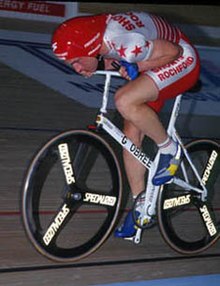
Back جرايم اوبرى ARZ Graeme Obree Catalan Graeme Obree Czech Graeme Obree Welsh Graeme Obree Danish Graeme Obree German Graeme Obree Spanish گریم اوبری Persian Graeme Obree French Graeme Obree Italian
 Obree on Old Faithful | ||||||||||||||||||
| Personal information | ||||||||||||||||||
|---|---|---|---|---|---|---|---|---|---|---|---|---|---|---|---|---|---|---|
| Full name | Graeme Obree | |||||||||||||||||
| Nickname | Flying Scotsman | |||||||||||||||||
| Born | 11 September 1965 Nuneaton, Warwickshire, England | |||||||||||||||||
| Height | 1.80 m (5 ft 11 in) | |||||||||||||||||
| Weight | 73 kg (161 lb; 11 st 7 lb) | |||||||||||||||||
| Team information | ||||||||||||||||||
| Current team | Fullarton Wheelers | |||||||||||||||||
| Discipline | Road and track | |||||||||||||||||
| Role | Rider | |||||||||||||||||
| Rider type | Time Trial Specialist | |||||||||||||||||
| Major wins | ||||||||||||||||||
| ||||||||||||||||||
Medal record
| ||||||||||||||||||
Graeme Obree (born 11 September 1965[1]), nicknamed The Flying Scotsman, after the famous steam train, is a Scottish racing cyclist who twice broke the world hour record, in July 1993 and April 1994, and was the individual pursuit world champion in 1993 and 1995. He was known for his unusual riding positions and for the Old Faithful bicycle he built which included parts from a washing machine. He joined a professional team in France but was fired before his first race. He also competed in the men's individual pursuit at the 1996 Summer Olympics.[2]
Obree has created some radical innovations in bicycle design and cycling position but has had problems with the cycling authorities banning the riding positions his designs required. Obree has been very open about living with bipolar disorder and depression, and the fact that he has attempted suicide three times, using his experiences as a means of encouraging other sportspeople to talk about their own mental health.[3][4]
His life and exploits have been dramatised in the 2006 film The Flying Scotsman and more recently in the documentary film Battle Mountain: Graeme Obree's Story, which follows his journey to Battle Mountain, Nevada to compete in the 2013 World Human Powered Speed Championships.
In March 2010, he was inducted into the Scottish Sports Hall of Fame.[5]
- ^ "Graeme Obree". Cycling Archives. Retrieved 19 March 2021.
- ^ Evans, Hilary; Gjerde, Arild; Heijmans, Jeroen; Mallon, Bill; et al. "Graeme Obree Olympic Results". Olympics at Sports-Reference.com. Sports Reference LLC. Archived from the original on 18 April 2020. Retrieved 5 March 2020.
- ^ Roe, Nicholas (9 June 2007). "Against all odds". The Daily Telegraph. Retrieved 19 March 2021.
- ^ Hicks, Robert (10 November 2015). "Graeme Obree: why we need to talk about depression in sport". Cycling Weekly. Retrieved 25 July 2019.
- ^ "Six sporting legends honoured in Scottish Sports Hall of Fame". Scottish Sports Hall of Fame. 16 March 2010. Archived from the original on 23 July 2011. Retrieved 17 August 2010.